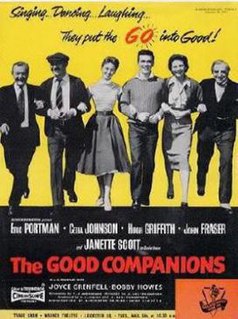
Cecil Louis Troughton Smith, known by his pen name Cecil Scott "C. S." Forester, was an English novelist known for writing tales of naval warfare, such as the 12-book Horatio Hornblower series depicting a Royal Navy officer during the Napoleonic wars. The Hornblower novels A Ship of the Line and Flying Colours were jointly awarded the James Tait Black Memorial Prize for fiction in 1938. His other works include The African Queen.
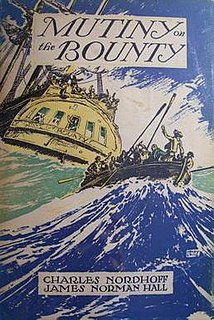
Mutiny on the Bounty is the title of the 1932 novel by Charles Nordhoff and James Norman Hall, based on the mutiny against Lieutenant William Bligh, commanding officer of the Bounty in 1789. It has been made into several films and a musical. It was the first of what became The Bounty Trilogy, which continues with Men Against the Sea, and concludes with Pitcairn's Island.
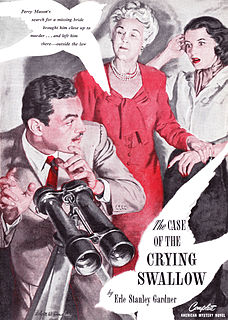
Perry Mason is an American fictional character, a criminal defense lawyer who is the main character in works of detective fiction written by Erle Stanley Gardner. Perry Mason is featured in more than 80 novels and short stories, most of which involve a client's murder trial. Typically, Mason establishes his client's innocence by implicating another character, who then confesses.

Shirley Hardie Jackson was an American writer, known primarily for her works of horror and mystery. Over the duration of her writing career, which spanned over two decades, she composed six novels, two memoirs, and over 200 short stories.
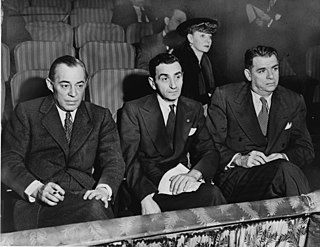
Rodgers and Hammerstein refers to the duo of composer Richard Rodgers (1902–1979) and lyricist-dramatist Oscar Hammerstein II (1895–1960), who together were an influential, innovative and successful American musical theatre writing team. They created a string of popular Broadway musicals in the 1940s and 1950s, initiating what is considered the "golden age" of musical theatre. Five of their Broadway shows, Oklahoma!, Carousel, South Pacific, The King and I and The Sound of Music, were outstanding successes, as was the television broadcast of Cinderella (1957). Of the other four that the team produced on Broadway during their lifetimes, Flower Drum Song was well-received, and none was an outright flop. Most of their shows have received frequent revivals around the world, both professional and amateur. Among the many accolades their shows garnered were thirty-four Tony Awards, fifteen Academy Awards, the Pulitzer Prize, and two Grammy Awards.

Marcel Aymé was a French novelist, children's writer, humour writer, screenwriter and theatre playwright.

John William Van Druten was an English playwright and theatre director, known professionally as John Van Druten. He began his career in London, and later moved to America becoming a U.S. citizen. He was known for his plays of witty and urbane observations of contemporary life and society.

Walter John "Jack" Buchanan was a Scottish theatre and film actor, singer, dancer, producer and director. He was known for three decades as the embodiment of the debonair man-about-town in the tradition of George Grossmith Jr., and was described by The Times as "the last of the knuts." He is best known in America for his role in the classic Hollywood musical The Band Wagon in 1953.

Victor and Victoria is a 1933 German musical comedy film directed by Reinhold Schünzel starring Renate Müller as a woman pretending to be a female impersonator. At the same time, Schünzel shot a French-language version of the film as George and Georgette starring Meg Lemonnier and a French cast.

Owen Gould Davis was an American dramatist. In 1919, he became the first elected president of the Dramatists Guild of America. He received the 1923 Pulitzer Prize for Drama for his 1923 play Icebound, and penned hundreds of plays and scripts for radio and film. Before the First World War, he also wrote racy sketches of New York high jinks and low life for the Police Gazette under the name of Ike Swift. Many of these were set in the Tenderloin, Manhattan. Davis also wrote under several other pseudonyms, including Martin Hurley, Arthur J. Lamb, Walter Lawrence, John Oliver, and Robert Wayne.
Jeremy Burnham is a British television actor of the 1960s and 1970s and a screenwriter.
A state fair is a competitive and recreational gathering in the United States. It may also refer to:
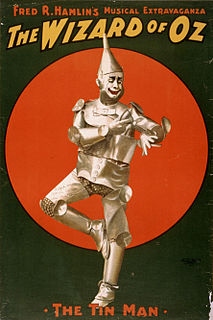
The Wonderful Wizard of Oz is a 1900 children's novel written by American author L. Frank Baum. Since its first publication in 1900, it has been adapted many times: for film, television, theatre, books, comics, games, and other media.
Jetlag Productions is an American animation studio that, just like the similar studio Golden Films, has created a number of animated films based on different, popular children's stories, while at the same time creating a few original productions. Produced mainly for the American market, the films were animated in Japan by KKC&D Asia among South Korean companies and were later released directly to VHS through the GoodTimes Home Video distribution company. Years later, with the introduction of DVD, a newer department of the same company, GoodTimes Home Entertainment, distributed the films in that new format. The films in Jetlag's catalog were dubbed into many different languages and were distributed by international departments of the GoodTimes corporation. Since 2005, the Gaiam company has held the copyrights to Jetlag Productions' animated films, following GoodTimes Entertainment's filing for bankruptcy.
W. P. LipscombWilliam Percy Lipscomb, was a British-born Hollywood playwright, screenwriter, producer and director. He died in London in 1958, aged 71.
A film à clef (or cinéma à clef, movie à clef, film à clé, is a film describing real life, behind a façade of fiction. "Key" in this context means a table one can use to swap out the names.


